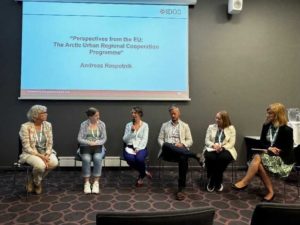Bådåddjo/Bodø is one of the European Capitals of Culture for 2024 and located north of the Arctic Circle. From 29 May to 3 June, the city hosted the Arctic Congress 2024, which aims to facilitate exchanges among researchers, practitioners and business representatives.
For the first time ever, the Arctic Congress combined the International Congress of Arctic Social Sciences (ICASS) XI, the UArctic Congress 2024 and the High North Dialogue 2024. The themes of the Congress “People of the North, Sustainable economic development, Climate and environment, Oceans” aligned with Norway’s Arctic Council Chairship program. The SUDEA team (Jacqueline Götze, Dr hab. Michał Łuszczuk and Dr Dorothea Wehrmann) participated in different activities:
Together with Associate Professor Dr Corine Wood-Donnelly (Nord University), Dr Dorothea Wehrmann organised the Workshop “Legitimacy deficits and tensions and their impact on cooperation” at Nord University. The workshop brought together researchers from Nord University, University of Groningen, Newcastle University, Bielefeld University, Maria-Curie-Skłodowska-University and University of Lapland who discussed empirical examples from the Arctic regions, where cross-border cooperation between state- and non-state actors has a long tradition.
To understand the roots of contested formats of cooperation in the Arctic regions without limiting the scope of research to a “before and after February 2022”, the workshop’s participants assessed examples from the North American, European and Russian Arctic regions in the light of different theoretical perspectives on legitimacy and legitimation. Thereby, the participants in this workshop moved beyond the classification of an “Arctic exceptionalism” and explored how observations from the Arctic also correspond to findings from legitimacy-studies in other regions and fields of research. The papers discussed will be complied into a Special Issue planned for early 2025.
At the Arctic Congress, the SUDEA team presented SUDEA research results in different sessions organised by colleagues from the University of Northern Iowa, Harvard University and the University of Lapland:
- “A new conceptual framework for analysing sustainable urban development in the Arctic” (Dr hab. Michał Łuszczuk, UMCS),
- “Localizing the Global Goals: Potentials and Challenges for Transnational Urban Cooperation in the Arctic” (Dr Dorothea Wehrmann, IDOS),
- “Sámi rights in EU policy-making” (Jacqueline Götze, IDOS with Anja Márjá Nystø Keskitalo, Saami Council)
Further, together with Kirsti Methi from the North Norway European Office, Dr Dorothea Wehrmann organised a roundtable “Localising Arctic cooperation during geopolitical turmoil and beyond: How to reconfigure frameworks and advance a pan-Arctic understanding of shared priorities” that invited colleagues from Harvard University, Fridtjof Nansen Institute, the Arctic Mayors’ Forum and IDOS. Main take-aways from the discussions are that despite the fact that local perspectives are still little considered in discussions on geopolitical impacts on the region, local actors seek to gain more agency to raise their voice together at higher governance levels.
Together with Anja Márjá Nystø Keskitalo (Saami Council), Jacqueline Götze (IDOS) moreover presented their work on “Sámi rights in EU policy-making” during the Workshop “Reimagining Sustainability: Critical Dialogues on Sámi and Indigenous Peoples’ Rights in the Green Transition” at the University of Helsinki. The transdisciplinary workshop brought together researchers from, amongst others, the University of Lapland, the Luleå University of Technology and the Arctic University of Norway as well as practitioners from Amnesty International, Saami Council, Silvermuseet and Bonavero Institute of Human Rights.
From different disciplinary backgrounds and perspectives, the participants exchanged about current challenges tied to the green transition, its effects on land use in the European Arctic and impacts on Indigenous peoples’ rights. Potential solutions for competing land uses and infringements against Indigenous peoples’ rights were discussed along the lines of legal and political means at different governance levels.

